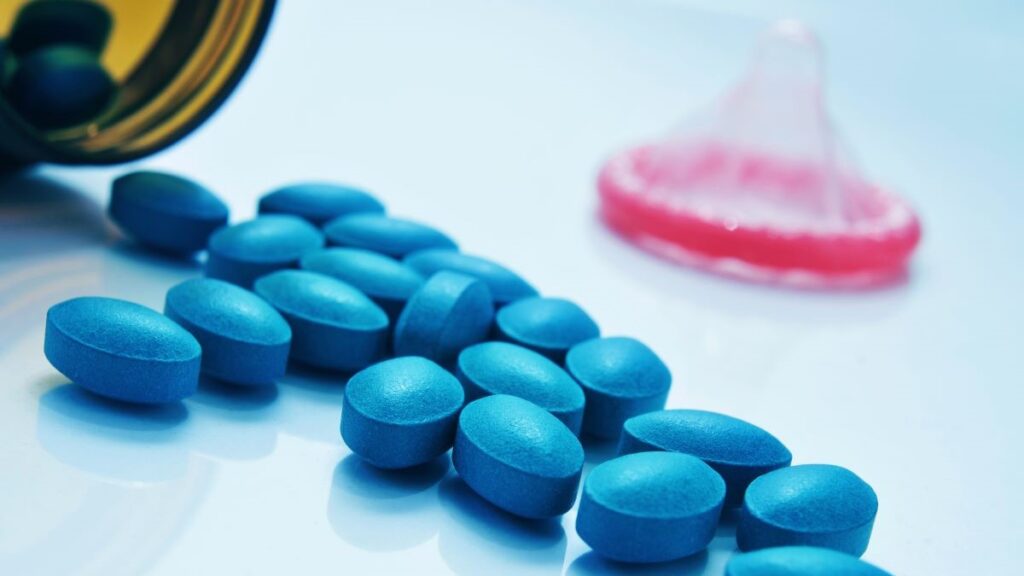Move over, Viagra and Cialis. A recent study in The Journal of Sexual Medicine reveals a natural and possibly healthier treatment for erectile dysfunction (ED) that doesn’t involve pills: aerobic exercise.
What is erectile dysfunction?
ED is a condition defined by Johns Hopkins Medicine as the persistent inability to achieve or maintain an erection that’s adequate for satisfying sexual activity.
Age-related factors are often to blame, including reduced testosterone levels, a decrease in sexual desire, changes in blood vessels and their lining, and a higher occurrence of health issues like hypertension, diabetes, and obesity.
However, younger men are increasingly reporting issues with erectile function.
Side effects of ED can include a lower quality of life, anxiety, depression, and relationship troubles.
Drug therapy for ED

Popular drug treatments for ED such as Viagra and Cialis have become household names.
They work by blocking an enzyme called phosphodiesterase type 5 (PDE5), which boosts blood flow to the penis and helps create an erection in response to sexual stimulation.
Although PDE5 inhibitors are effective for many with ED, they require a prescription and can have side effects. Not everyone can safely use these medicines, especially people who take nitrates for heart problems. If used together, they can dangerously lower blood pressure.
The study
A team of researchers in the United States systematically reviewed findings from 11 studies involving 1,147 men to determine whether aerobic exercise impacts erectile function. Most participants were middle-aged, and many were obese or overweight.
Aerobic exercise, also known as cardio, is a type of physical activity that engages large muscle groups such as walking, biking, and swimming. These rhythmic and repetitive activities elevate heart rate and oxygen use.
All studies randomly assigned participants to either a treatment group (in this case, those doing aerobic exercise) or a control group (those not doing the exercise).
They used the International Index of Erectile Function – Erectile Function (IIEF-EF) domain score, a questionnaire designed to assess various facets of erectile performance and to gauge the severity of erectile dysfunction. They compared scores between exercise and control groups using a random-effects meta-analysis and examined the influence of various factors through meta-regression.
Exercise programs lasted from 2 to 24 months, with a typical duration of 6 months.
Six studies focused on supervised aerobic exercises, while five others encouraged more physical activity through resources and counseling, but without direct supervision. Exercise sessions were usually 30 to 60 minutes long, happening 3 to 5 times a week.
The control groups generally continued their normal lifestyle. In three of the trials, the control group received health improvement resources, but with little emphasis on increasing physical activity.

The results
Aerobic exercise led to enhanced erectile function compared to the control groups.
Researchers wrote the results were “not only statistically significant but also clinically meaningful.”
Those who started with more severe symptoms of ED saw a greater relative improvement after incorporating aerobic exercise into their routine. However, individuals with mild erectile issues also benefited.
As a result, researchers called regular aerobic exercise a potential low-risk and effective non-drug treatment option for those at risk for or already dealing with ED.
This meta-analysis also found cardio complements traditional treatments such as PDE5 inhibitors.
How cardio improves erections
Regular aerobic exercise helps maintain or improve erectile function in several ways:
- Improves cardiovascular health: Healthy blood flow is essential for erectile function.
- Increases testosterone levels: Stimulates hormonal systems and reduces hormones that bind to testosterone, making more testosterone available.
- Aids in weight loss: Overweight or obese individuals have a higher risk for ED.
- Lowers blood pressure: Addresses a key risk factor for ED.
- Regulates blood sugar: Helps control diabetes, another ED risk factor.
- Enhances blood vessel health: Boosts nitric oxide production, supporting normal erectile function.
- Reduces oxidative stress and inflammation: Both are linked to the development of ED.
Erectile health progress
Although the study highlights cardio’s positive impact on erectile function, it has a few limitations.
The diversity of participants, their personal health backgrounds, and varying exercise programs make it difficult to pinpoint the most effective exercise for ED. In addition, only aerobic exercises were considered, not others like weightlifting or pelvic floor exercises.
Regular cardio also isn’t safe or accessible for everyone.
For doctors, it’s a reminder to tailor exercise prescriptions with care.
Here’s to future research that leads to a clear playbook for erectile health excellence!
Featured Image Source: Shutterstock



